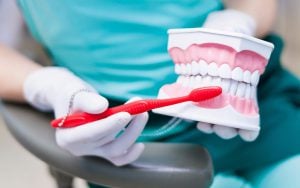Seeing blood in the sink while brushing can be anything from slightly concerning to alarming. If you see blood when brushing your teeth but no pain occurs, you may ignore it or wait to see what happens the next time you brush. Alternatively, you might worry that something serious is going on.
Bleeding when brushing teeth, even with no pain, is never ordinary or healthy. The causes of bleeding gums during brushing vary, depending on your health condition or other factors. Here is a more in-depth look into the reasons and what you can do to remedy bleeding gums.
Why Do My Gums Bleed When I Brush My Teeth?
There are many causes of bleeding gums, some of which are related to brushing and flossing habits. For instance, you could be brushing too roughly or using a brush with bristles that are not soft enough. In some cases, reducing the pressure or selecting a brush with softer bristles may remedy the situation.

Some pregnant women may experience bleeding while brushing, which is common in the second and third trimesters. This happens due to increases in hormone production, causing more blood flow to gums, morning sickness leaving more acid on your gums, cravings for more carbs and sweets, and decreases in protective saliva. After the birth of a child, these symptoms should go away. In the meantime, maintaining regular brushing and flossing is essential.
Some health conditions can cause bleeding gums, particularly diabetes, which a person can manage by controlling sugar consumption. Blood disorders like hemophilia can leave a person susceptible to gum bleeds, which patients can control with medication. Another blood disorder, immune thrombocytopenic purpura (ITP), causes a decrease in the number of platelets that help stop bleeding. People with ITP can occasionally suffer from bleeding from the mouth and gums.
It is no secret that chemotherapy can cause serious side effects, including those affecting the mouth. People experiencing certain types of cancer, like leukemia, may notice some gum bleeding. If you are receiving cancer treatment or chemotherapy and have bleeding gums, alert your dentist, who can work with your oncologist on your treatment regimen.
People taking certain medications or undergoing treatments may experience painless gum bleeding. For instance, blood thinners like Coumadin and aspirin can make gum bleeding more likely. People using blood thinners can try waxed floss instead of toothpicks and a soft-bristle toothbrush to reduce the bleeding. Patients on blood thinners are much more susceptible to plaque and tarter causing the bleeding gums so rigorous dental hygiene is mandatory. If bleeding gums persists in the presence of good oral hygiene, you should consult with your physician to confirm you are taking your medication correctly.
Using cigarettes and other tobacco products can make gum bleeding more frequent. Gum disease has been linked to smoking, inhibiting the body’s ability to fight harmful bacteria in the gum tissue.
Diet is sometimes a culprit for bleeding gums. Eating starchy and sugary foods can increase plaque and tartar buildup, contributors to gingivitis. Not getting enough leafy green vegetables can deprive your body of Vitamin K, leading to bleeding.
Lack of Vitamin C might also be to blame. In more severe cases, Vitamin C deficiency can lead to scurvy, causing not only bleeding gums but also tooth loosening and bleeding beneath the skin.
How to Stop Gums From Bleeding
Even when no pain occurs, bleeding gums is abnormal, and you should work to correct the issue. You can try some home remedies for minor bleeding gums, such as applying clean, wet gauze (folded paper towel) to the affected gum area. You can also use an ice cube or cold compress to alleviate the swelling and bleeding. If blood thinners are suspected to be the cause of the bleeding gums, apply firm pressure while using the wet gauze/paper towel for 10 minutes or more and seek medical attention to ensure you are taking your blood thinners properly.

Sometimes changing your diet, such as limiting sugary, processed, and starchy foods, can do the trick. Eating crunchy vegetables like carrots or celery can remove food particles in-between brushing. Also, leafy greens can address Vitamin K deficiency.
Among the many benefits of quitting smoking, boosting gum health is one of them. If you smoke and later decide to quit, you will probably see positive changes in your gums and oral health.
Good oral hygiene may not stop gum bleeding, or the gums may change appearance. If you continue to notice pain, swelling, and continued bleeding, you could be experiencing early-stage gum disease or gingivitis. A visit to the dentist can confirm this. Early intervention can prevent gum disease and gingivitis from progressing and becoming periodontitis, a severe form of gingivitis that often leads to tooth decay and loss.
For gingivitis or periodontitis, your dentist may recommend scaling and root planing, a deep-cleaning method to remove excess plaque and tartar and restore gum health. This procedure involves using a dental scaler or curette to remove the plaque and tartar on the tooth surface and below the gums. The next step is to smooth the tooth roots so that the gums can heal and reconnect with the teeth. Scaling and root planing may require more than one office visit.
If you notice that your gums bleed while brushing, improving your oral hygiene to rule out poor dental health never hurts. If the bleeding is because of other factors, your dentist can recommend treatments and ways to preserve your gum health.
- Dental Implant Pros and Cons - August 26, 2023
- Receding Gums Stages - August 12, 2023
- When Is It Too Late for Gum Grafting? - July 8, 2023


